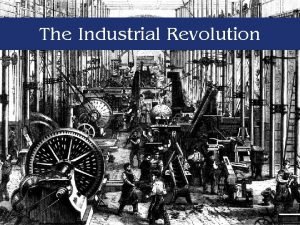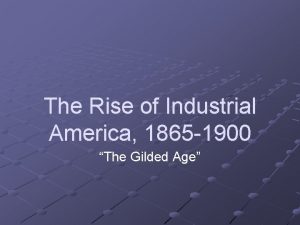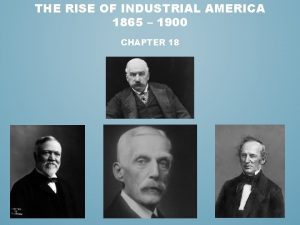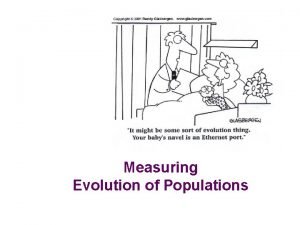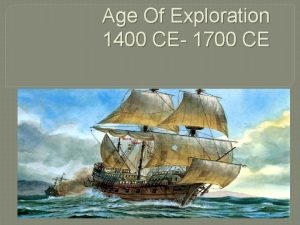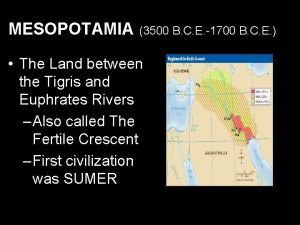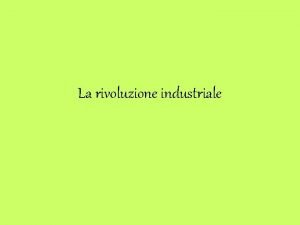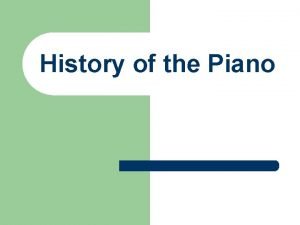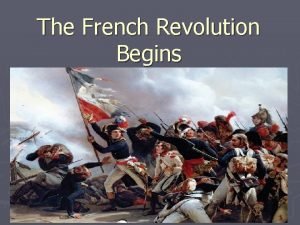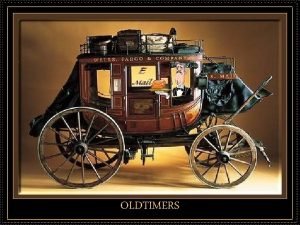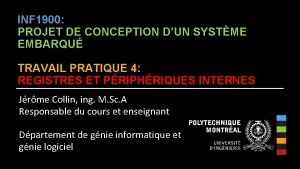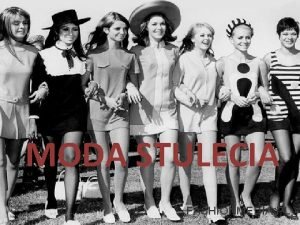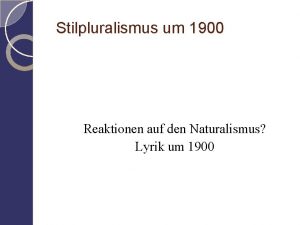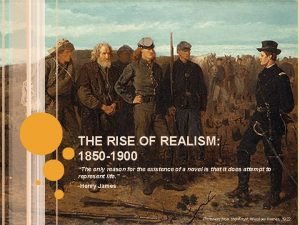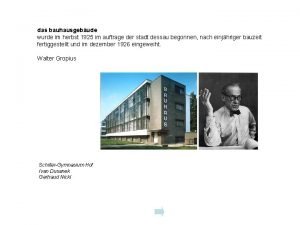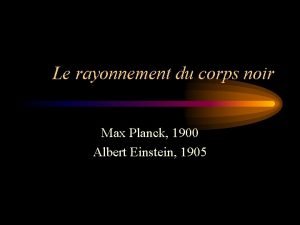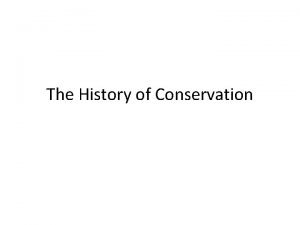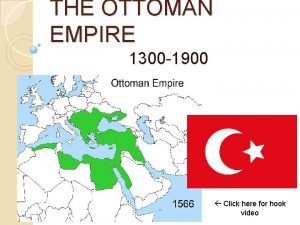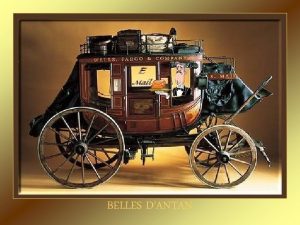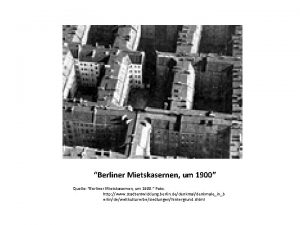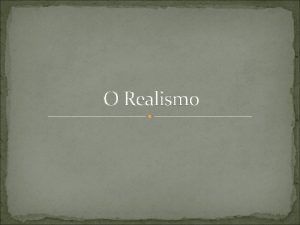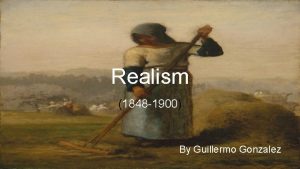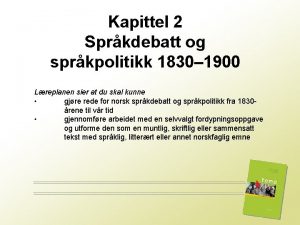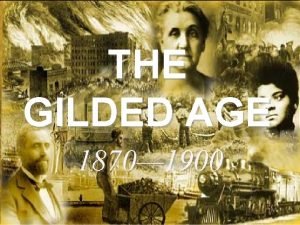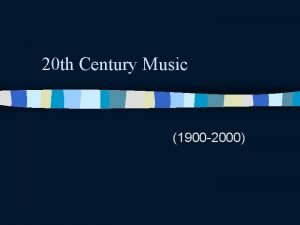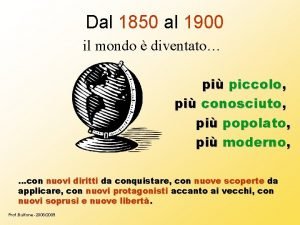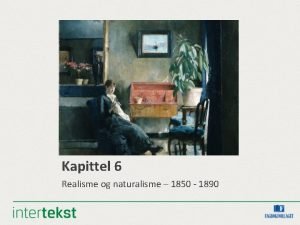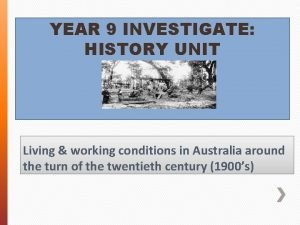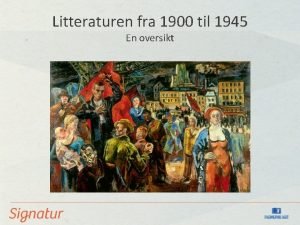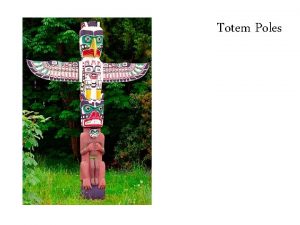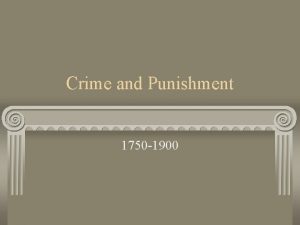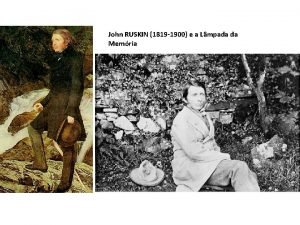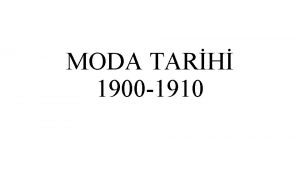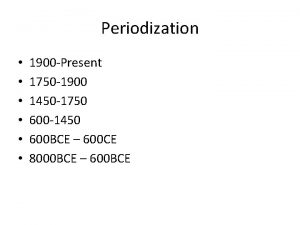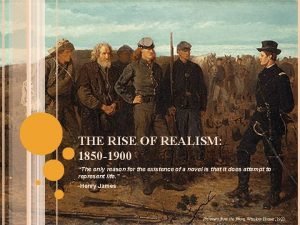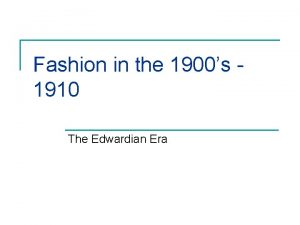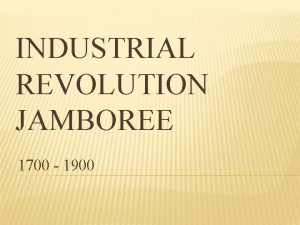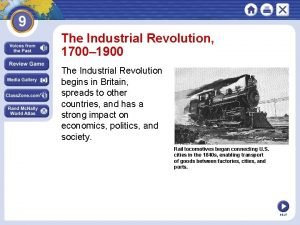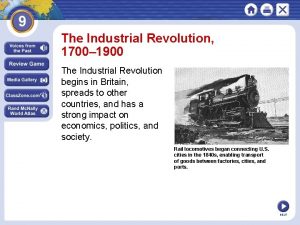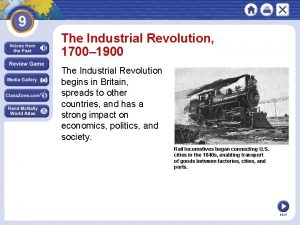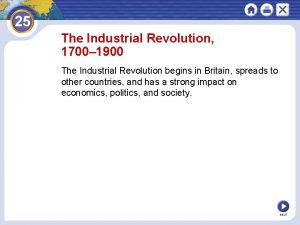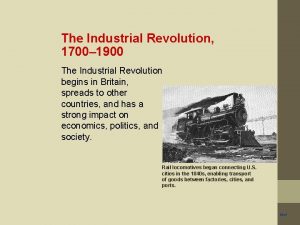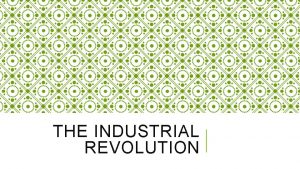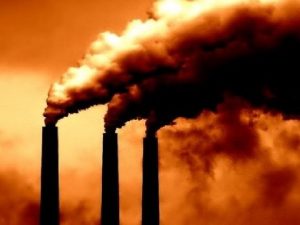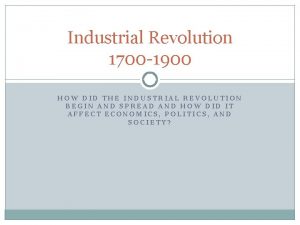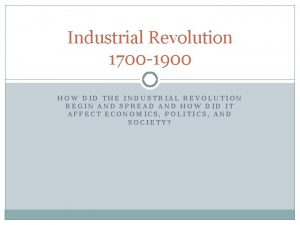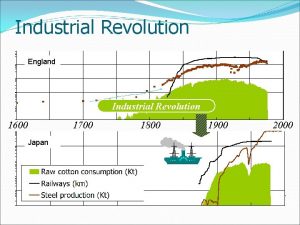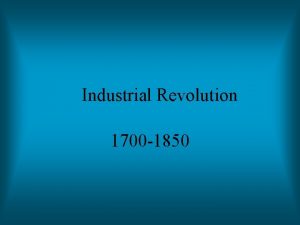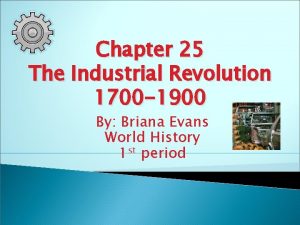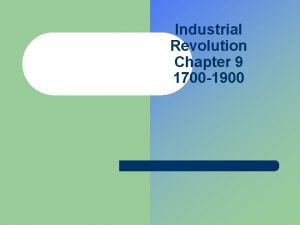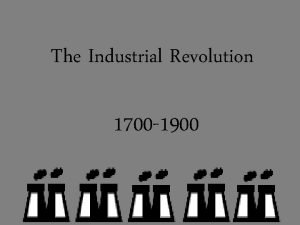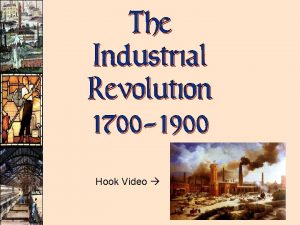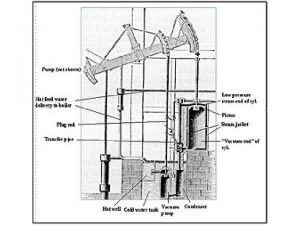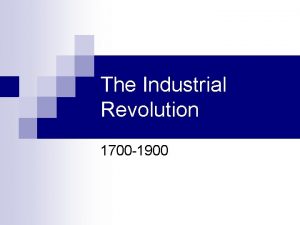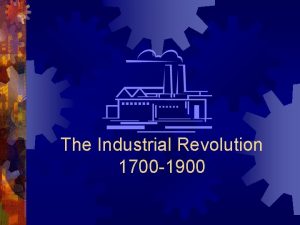THE INDUSTRIAL REVOLUTION 1700 1900 Industrial Revolution Essential















































































- Slides: 79

THE INDUSTRIAL REVOLUTION 1700 - 1900

Industrial Revolution Essential Question ® How did the Industrial Revolution begin and spread and how did it affect economies, politics, and society?

Industrialism Begins ® Setting the Stage: Stage In the United States, France, and Latin America political revolutions brought new governments. A different type of revolution now transformed the way people worked. ® INDUSTRIAL REVOLUTION: The shift, beginning In the 1750 s, from making goods by hand to making them by machine. ® Industrialism New economic system ® Rely on machinery rather than animal and human ®

The Beginnings of Industrialization ® a. Wealthy landowners began buying up most of the land that was worked by village farmers. ® b. The large landowners improved farming methods

A. The Agricultural Revolution paves the way 1. Landowners enclosed smaller farms into one large area a. Enclosures 1. 2. Landowners experimented with more productive seeding and farming methods to grow bigger and better crops. Results a. Landowners tried new agricultural methods b. Large landowners force small farmers to become a tenant farmer or give up farming and move to cities.

® Jethro Tull ® First Scientific Farmer; invented the seed drill, which allowed to plant seed in well spaced rows.

B. Rotating Crops 1. System of growing different crops in a field each year to improve the fertility of the land a. Allowed 2. Livestock farmers to grow more/better crops. breeders improved methods too. a. Only allowed the best livestock to breed which increased weight of animals.

3. Result: a. As food supplies increased and living conditions improved, England’s population grew very fast. b. An increasing population boosted the demand for food and goods such as cloth. c. Farmers who lost their land became factory workers.

The Beginnings of Industrialization ® Rotating Crops Crop rotation – switching crops each year to avoid soil depletion ® Selective Breeding – Livestock breeders allow only the best to breed, improve the food supply ®

Selective Breeding

Why did the IR begin in Britain? 1. Extensive Natural Resources

1. Industrialization – the processes of developing machine production of goods which requires resources. Water power and coal to fuel machines b. Iron ore to construct machines, tools and buildings c. Rivers for transportation d. Harbors from which merchant ships can set sail. a.

1. Expanding Economy to support industrialization. 2. Investment in manufacture of new inventions 3. Highly developed banking system 4. Availability of bank loans for investment 5. Growing overseas trade 6. Political stability 7. Positive attitude 8. Parliament passed laws to encourage and protect business adventures

1. ***Britain had all of the factors of production (resources needed to produce goods and services that were needed for the Industrial Revolution) ® A. Land ® B. Labor ® C. Capital (wealth)

II. Inventions Spur Industrialization ® 1. Inventions revolutionized industry ® 2. Britain's textile industry clothed the world in wool, linen, and cotton was the FIRST to be transformed.

Inventions Spur Industrialization ® Changes ® Flying in the Textile Industry Shuttle (1733) John Kay ® Doubled the work a weaver could do in a day ®

Inventions Spur Industrialization (cont) ® Spinning Jenny (1764) James Hargreaves ® One spinner could work eight thread at a time ®

Inventions Spur Industrialization (cont) ® Water Frame (1769) Water Frame Richard Arkwright ® Machines could now be powered by water, not just hand ®

Inventions Spur Industrialization (cont) ®. Samuel Crompton- Spinning Mule- made thread that was stronger, finer, and more consistent than earlier spinning machines.

Inventions Spur Industrialization (cont) ® Power Loom (1787) Edmund Cartwright ® Sped up the weaving process ®

Inventions Spur Industrialization ® Changes ® Cotton in the Textile Industry (cont) Gin (1793) Eli Whitney ® Multiplied the amount of cotton produced ® ® Development of Factories Buildings that contain machinery for manufacturing ® First factories needed to be near rivers for water power ®

The Cotton Gin and Eli Whitney

The First Factories

3. Inventions in America ® In the United States, American inventors worked at making railroad travel more comfortable, inventing adjustable upholstered seats. They also revolutionized agriculture, manufacturing, and communications:

® a. 1831 Cyrus Mc. Cormick’s reaper boosted American wheat production. ® b. 1837 Samuel F. B. Morse, a New England painter, first sent electrical signals over a telegraph.

®. 1851 I. M. Singer improved the sewing machine by inventing a foot treadle (pedal) ® d. 1876 Scottish-born inventor Alexander Graham Bell patented the telephone.

Improvements in Transportation ® 1. Progress in the textile industry spurred other industrial improvements for example, the steam engine.

A. Watt’s Steam Engine ® 1. James Watt - figured out a way to make the steam engine work faster and more efficiently while burning less fuel 2. Matthew Boulton- entrepreneur a person who organizes, manages, and takes on the risks of a business. Paid Watt to build better engines

James Watt and the Steam Engine

B. Water Transportation 1. Robert Fulton- built a steamboatferried passengers up and down the Hudson River. ® 2. In England, water transportation improved with the creation of a network of canals, or human- made waterways. ®

Robert Fulton and the Clermont

C. Road Transportation ® 1. John Mc. Adam- equipped road beds with a layer of large stones for drainage ® a. heavy wagons could travel over the new “macadam” roads without sinking in mud. ® 2. Turnpikes or Toll Roads were invented- travelers had to stop to pay tolls before traveling farther.

The Railway Age Begins ® Railroad Revolutionize Life ® The Railroad System ® Spurs industrial growth ® Creates jobs ® Provides cheaper transportation ® Boosts many industries ® Causes people move to cities

® **** The railroad locomotive—drove English industry after 1820. A. Steam-Driven Locomotives ® 1. Richard Trevithick hauled ten tons of iron over nearly ten miles of track in a steamdriven locomotive. 2. George Stephenson- world’s first railroad line. ®

® B. The Liverpool-Manchester Railroad ® 1. The entrepreneurs of northern England wanted a railroad line to connect the port of Liverpool with the inland city of Manchester. The Rocket was the engine that was on the railway line.

® C. Railroads Revolutionize Life in Britain ® 1. railroads spurred industrial growth by giving manufacturers a cheap way to transport materials and finished products. ® 2. the railroad boom created hundreds of thousands of new jobs for both railroad workers and miners.

® 3. the railroads boosted England’s agricultural and fishing industries, which could transport their products to distant cities. ® 4. by making travel easier, railroads encouraged country people to take distant city jobs.

The Railway Age Begins ® First Railroad Line ® George Stephenson (1825) ® Liverpool-Manchester ® Used Line (1829) Stephenson’s “Rocket” ® World’s best locomotive

QUICK QUIZ ® 1. What were four factors that contributed to industrialization in Britain? ® 2. How did rising population help the Industrial Revolution? ® 3. What American invention aided the British textile industry?

II. Industrialization ® Factory Work ® ® Changes Life Pays more than farms Spurs the demand for more expensive goods ® Rise of Industrial Cities ® Urbanization – movement of people to city ® Population growth provides work force, markets for goods ® Major cities: London, Manchester, Liverpool, Birmingham





The Working Class ® Living Conditions ® Rapid Urbanization caused: ® Cities without adequate housing, education, and police protection ® Urban slums ® Disease and sickness spread quickly ® Life span is only 17 years ® Lack of sanitary & building codes


The Working Class ® Working Conditions Average workday – 14 -16 hours ® 6 days a week, year round ® Dirty, poorly lit factories ® Numerous injuries and death ® No health insurance ® No labor laws ® Eventually replaced by machines ® Huge population means large unemployment ®


The Rise of the Middle Class ® The Middle Class ® Factories helped to create a new group of people – the middle class Skilled workers, merchants, rich farmers, managers, and professionals ® Had a comfortable standard of living ® ® Looked down upon by aristocrats and landowners

Positive Effects of the Industrial Revolution ® Immediate Benefits Creates jobs ® Enriches nation ® Encourages technological progress ® Education expands ® Cheaper goods, including clothing ® ® Long Term Effects Improved standard of living ® Improved working conditions ® Increase in taxes lead to urban improvements ®

III. Industrialization Spreads ® The Rise of Corporations ® Stock Limited ownership rights for company ® Sold to raise money ® ® Corporation ® Company owned by stockholders ® Share profits not debts ® Large corporations attempt to control as much business as they can

The Impact of Industrialization ® Rise of Global Inequality ® Wealth gap between nations widens ® ® Europe & US gain economic power Non-industrialized nations fall further behind l African and Asian countries lag l Still based on agriculture ® Imperialism spreads ® Need for raw materials and new markets ® European nations & US exploit colonies for resources ® Transformation of Society ® The Middle Class gains influence and power ® Begins calls for reform

IV. Philosophers of Industrialization ® Laissez-faire Economics Policy of not interfering with business ® “The Wealth of Nations” ® ® Published by Adam Smith Defended free markets & laissez-faire Economic liberty guarantees economic progress ® Economic natural laws Self-interest ® Competition ® Supply and Demand ®

The Economists of Capitalism ® System of privately owned businesses seeking profits ® Malthus ® Thomas Malthus ® ® ® and Ricardo Believed populations grew faster than the food supply Wars, epidemics kill off extra people or misery and poverty result David Ricardo ® Saw a permanent poor underclass that provided cheap labor

Malthus Ricardo

Utilitarianism and Utopia ® Utilitarianism Judge things by their usefulness (Bentham) ® Regulation to help workers and spread wealth (JS Mill) ® ® Utopian Society Established by Robert Owen ® Community that improved worker conditions and provided cheap housing ® Located in New Harmony, Indiana ®


The Rise of Socialism ® Factors of production owned by, operated for the people ® Power of the Government ® Government control can end Poverty ® Bring equality ®

Radical Socialism – Karl Marx ® The Communist Manifesto ® Karl Marx and Friedrich Engels ® Fundamental Beliefs ® Society divided into warring classes ® The “haves” vs. the “have-nots” ® The “haves” ® Employers or bourgeoisie ® The “have-nots” ® The workers or proletariat ® Prediction ® The workers will overthrow the owners


The Future According to Marx ® Capitalism will destroy itself ® Inequality would cause workers to revolt ® This ® would lead to communism Society where people own and share the means of production l What are the “means of production”? l Land, mines, factories, railroads and businesses

Labor Unions and Reform Laws ® What ® is a union? Association formed by laborers to work for change ® What ® Negotiate for better wages and conditions ® Who ® were the first to do this? Skilled workers are the first to unionize ® How ® do they do? were they able to do this? Movement in US and UK to fight to right to unionize


Labor Unions and Reform Laws ® Laws were passed to stop abuses of industrialization ® Examples of reform laws ® Maximum workday ® Ending or limiting of child labor

The Reform Movement Spreads ® Abolition of Slavery ® Reformers help to end slavery In British Empire (1833) ® The Americas (1888) ® ® Fight for Women’s Rights ® Pursuit of economic and social rights as early as 1848 ® Founding of the International Council for Women (1888)

Other Reforms ® Free public education ® Established in Europe by late 1800 s ® Established in US by 1850 s ® Prison reform also sought ® Focus on rehabilitation

Nineteenth Century Progress ® Inventions and Inventors Make Life Easier ® Thomas Edison ® ® Granted over 1, 000 patents from his research Including the light bulb

Nineteenth Century Progress ® Inventions and Inventors Make Life Easier (cont) ® Alexander Graham Bell ® Invented the telephone (1876)

Nineteenth Century Progress ® Inventions and Inventors Make Life Easier ® Guglielmo ® Marconi Invented the radio (1895)

Nineteenth Century Progress ® Inventions and Inventors Make Life Easier ® Karl Benz ® ® Invented the automobile in 1885 Henry Ford ® Lowers the cost of the automobile using the assembly line

Nineteenth Century Progress ® Inventions and Inventors Make Life Easier ® The Wright Brothers ® Develop the first working airplane

Nineteenth Century Progress ® New Ideas in Medicine ® Medical research leads to Development of vaccines ® Improvement in sanitation ® ® Louis ® Pasteur Discovered the bacteria cause disease ® Joseph Lister Links bacteria to surgical problems ® Begins the sterilization process of tools ®

Nineteenth Century Progress ® New Ideas in Science ® Beginning ® Archeology l ® study of people and societies Anthropology l ® study of society through material remains Sociology l ® of numerous branches: study of the origin, the behavior, and development of humans Psychology l study of human or animal mental functions and behaviors

Nineteenth Century Progress ® New Ideas in Science ® Charles ® Theory of Evolution l Gradually over time species evolve ® Gregor ® Darwin Mendel Discovers patterns to inherited traits l Begins the science of genetics

Nineteenth Century Progress ® New ® John Dalton ® ® Theorizes that all matter is made of atoms Dmitri Mendeleev ® ® Ideas in Science (cont) Creates Periodic Table of the Elements Marie and Pierre Curie ® ® Discover radioactivity Marie becomes the first woman to win the Nobel Peace Prize (Science)

Nineteenth Century Progress ® New Ideas in Science (cont) ® Ivan ® Pavlov Human actions are unconscious reactions ® Sigmund ® Freud Studied the unconscious mind

Ivan Pavlov

Nineteenth Century Progress ® Development ® 1800 s of Mass Culture saw the creation of Movie Theaters ® Professional Sports ® l l Boxing Baseball

THE END
 Essential questions for industrial revolution
Essential questions for industrial revolution The rise of industrial america 1865-1900
The rise of industrial america 1865-1900 Four features of industrial manufacturing (1865-1900)
Four features of industrial manufacturing (1865-1900) Characteristics of lipids
Characteristics of lipids Rivoluzione agricola 1700
Rivoluzione agricola 1700 1700/23
1700/23 1 in 1700 us caucasian newborns have cystic fibrosis
1 in 1700 us caucasian newborns have cystic fibrosis Christopher columbus significance
Christopher columbus significance 1700 luvun aatesuunta
1700 luvun aatesuunta Lexile 1700
Lexile 1700 Cisco mobility express bundle
Cisco mobility express bundle Dynastic cycle def
Dynastic cycle def Rotazione quadriennale 1700
Rotazione quadriennale 1700 Eric weiner fdny
Eric weiner fdny 1700 bce
1700 bce Esapideak zerrenda
Esapideak zerrenda 1700/1600
1700/1600 Characteristics of puritan age
Characteristics of puritan age Piano 1700
Piano 1700 The french revolution begins
The french revolution begins French revolution essential questions
French revolution essential questions The third agricultural revolution
The third agricultural revolution Russian revolution vs french revolution
Russian revolution vs french revolution Economic causes of french revolution
Economic causes of french revolution Cadillac 1900
Cadillac 1900 Inf1900
Inf1900 Kapcie emu 1900
Kapcie emu 1900 Stilpluralismus
Stilpluralismus Map of the ottoman empire
Map of the ottoman empire Realism 1850 to 1900
Realism 1850 to 1900 Zurn z1752
Zurn z1752 Usenet message marian
Usenet message marian Kristallpalast london bauzeit
Kristallpalast london bauzeit Ottoman empire in 1750
Ottoman empire in 1750 1900 max planck
1900 max planck 1820-1900
1820-1900 1900 year in words
1900 year in words Taylor grazing act 1934
Taylor grazing act 1934 Saltanat e usmania map
Saltanat e usmania map Cadillac 1900
Cadillac 1900 Mietskasernen um 1900
Mietskasernen um 1900 Marketing 1900
Marketing 1900 Massasamenleving 1900
Massasamenleving 1900 Ley foraker
Ley foraker Moda 2000
Moda 2000 1900/1600
1900/1600 1750-1900 portfolio map
1750-1900 portfolio map Entre 1850 e 1900 surge nas artes europeias
Entre 1850 e 1900 surge nas artes europeias Imperialismo moderno
Imperialismo moderno Realism (1848–1900)
Realism (1848–1900) 1900 fashion history
1900 fashion history Språkdebatten 1900
Språkdebatten 1900 1865 to 1900 inventions
1865 to 1900 inventions Revolutionary leaders 1900-1939
Revolutionary leaders 1900-1939 Drottning soraya afghanistan
Drottning soraya afghanistan Freud 1900
Freud 1900 Kielimanifesti
Kielimanifesti Population of europe 1900
Population of europe 1900 Renaissancism
Renaissancism Scoperte scientifiche dal 1850 al 1900
Scoperte scientifiche dal 1850 al 1900 Realistiske trekk
Realistiske trekk 1800 to 1900 fashion
1800 to 1900 fashion Living and working conditions in australia 1900
Living and working conditions in australia 1900 Arbeiderdiktning
Arbeiderdiktning Modernist poetry
Modernist poetry Bumblebee totem pole
Bumblebee totem pole Imperialism definition ww1
Imperialism definition ww1 Crime and punishment 1750 to 1900
Crime and punishment 1750 to 1900 Moda italia fashion
Moda italia fashion Tpq 1900
Tpq 1900 Resssucitar
Resssucitar Naturalismus historischer hintergrund
Naturalismus historischer hintergrund 1910 moda
1910 moda Cadillac 1900
Cadillac 1900 Iso 1900
Iso 1900 1750/600
1750/600 Realist novel
Realist novel 1900 hrs
1900 hrs Språkdebatten 1900
Språkdebatten 1900 Fashion 1900 to 1910
Fashion 1900 to 1910
